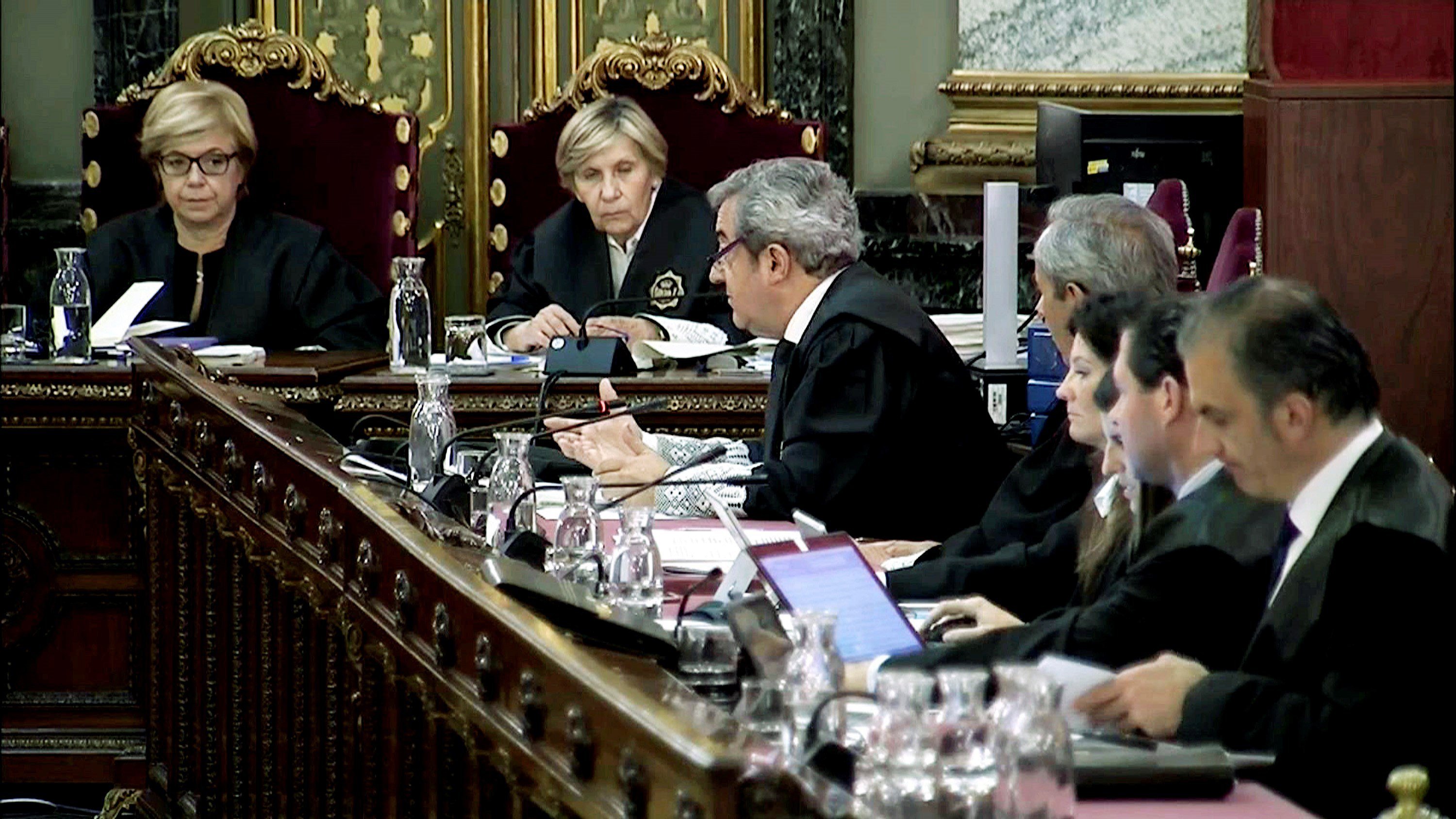Acting Spanish PM Pedro Sánchez still hasn't got what he wants and Francisco Franco will remain, for the moment, in the Valle de los Caídos. That was the decision this lunchtime from the fourth section of the third chamber of Spain's Supreme Court, unanimously accepting the precautionary measures requested by the dictator's family to suspend his exhumation and moving. The news came out whilst the court's second chamber was on a break from the Catalan independence trial. The members of the public attending, walking between the orange trees in the courtyard or queuing in front of the coffee machine, were commenting the severity of the remarks from prosecutors Javier Zaragoza and Jaime Moreno on the first day of closing statements.
One of those walking through the corridors was Òscar from Sant Boi de Llobregat near Barcelona. He was wearing inside-out a red t-shirt from the Catalan national day pro-independence rally on 11th September 2014, motto "Ara és l'hora" (Now is the time). He'd just been told to put it like that by a police officer. He didn't really understand because at the entrance, where they'd made him take off his pin showing support for the prisoners, they'd said nothing about the t-shirt. In fact, he'd been in the courtroom for half the morning with no problems. But the officer wouldn't compromise, he had to take it off and turn it inside-out. And so he was walking around the Supreme Court with his t-shirt inside-out.
Coup d'état
They've gone to great lengths to try and show a separation of politics and the law in the Supreme Court. At half nine, prosecutor Javier Zaragoza opened the closing speeches saying that "the aim of this trial has nothing to do with the criminalisation of political dissidence". "Political ideas are not being persecuted," he said.
Despite this, however, there was at all times a political tinge to proceedings. "There are no political prisoners," he said. He also had to tackle the claims of "arbitrary detention" from the UN working group on the subject, although he attributed it to the European Council instead.
According to Zaragoza, what happened in Catalonia was a coup d'état. Armed with handwritten notes, he spoke about a criminal agreement between the Parliament, government and civil society bodies. It was, he said with a wink to Gabriel García Márquez, the "chronicle of a rebellion foretold".
Unlike Zaragoza, his colleague Jaime Moreno avoided looking at the defendants and their lawyers whilst he talked, mostly on the subject of violence. Violence which he argues was "not at all insignificant" and sufficient to talk about rebellion. He denounced intimidation of the state's police forces and physical violence, which he said led to 93 officers being injured. He said they're not on trial for the fact of going to vote, but he also warned that it's not true that voting can never be a crime: "In democracy, voting is not possible without respect for the law".
After the morning break, it was the turn of prosecutor Consuelo Madrigal, who handled the charge of misuse of public funds. She talked of government strategies, "disguises" and "cross-dressing" to divert public money for the referendum. "You would have to have been blind or living on another planet to not realise," she joked. The conclusion from the public prosecution service is that more than 3 million euros (£2.7 million; $3.4 million) of public money was spent to hold the vote.
That other attempted coup
The last of the prosecutors to speak was Fidel Cadena, who handled the charge of rebellion which, he said, needs violence which "doesn't require the existence of weapons". More than that, according to him it doesn't require physical violence, merely intimidatory force. He suggested this was the case during the attempted coup on 23rd February 1981 when members of the Civil Guard took the Congress hostage, firing their weapons in the air: "Since physical violence was limited to that tripping and shaking of general Gutiérrez Mellado, may he rest in peace".
A buzz bubbled up in the room at that description of the events of 1981. It was the only moment when the presiding judge, Manuel Marchena, had to call for quiet in the court.

